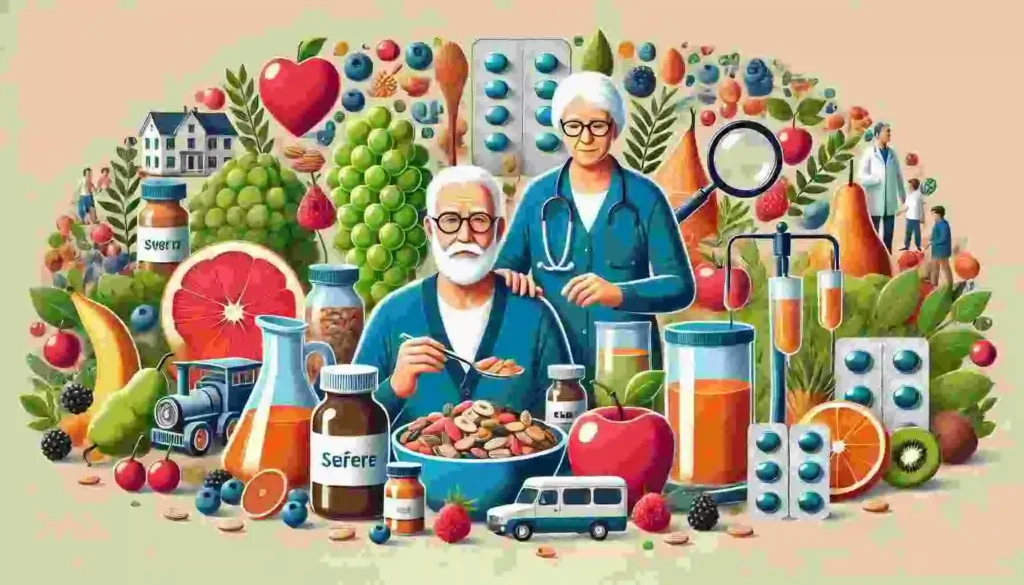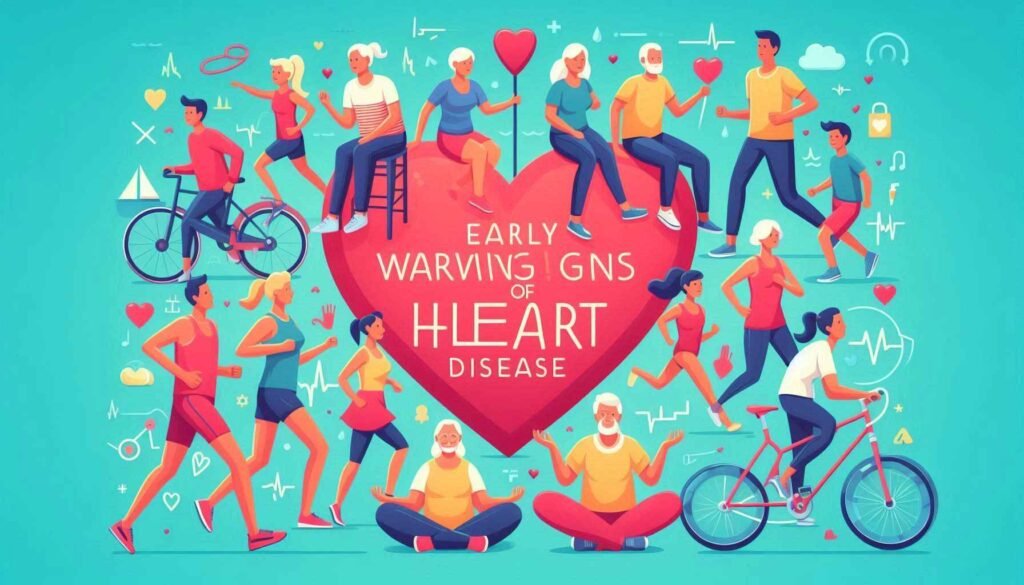
The Role of Nutrition in Healthy Aging: Essential Nutrients for Seniors
Aging is a natural part of life, but maintaining good health in your golden years depends largely on what you eat. The role of nutrition in healthy aging is crucial, as proper dietary choices can help prevent chronic illnesses, improve cognitive function, and boost overall well-being. If you’re looking to understand how nutrition supports healthy aging and what essential nutrients seniors need, this guide covers everything you need to know.
Let’s dive into the key nutritional needs for seniors and how they contribute to aging well.
Why Nutrition Matters More as You Age
As we get older, our bodies undergo several changes that make proper nutrition more important than ever. Here are some factors that highlight why seniors need to prioritize their diet:
- Slower Metabolism: The body’s metabolic rate slows down with age, meaning seniors require fewer calories. However, they still need high-quality, nutrient-dense foods to meet their needs.
- Reduced Appetite: Changes in taste, medications, and health conditions can reduce appetite, making it harder to get the necessary nutrients.
- Bone and Muscle Loss: Aging can lead to decreased bone density and muscle mass, increasing the risk of osteoporosis and sarcopenia (loss of muscle tissue).
- Weaker Immune System: A weakened immune system can make seniors more susceptible to infections and illnesses. Proper nutrition helps support immunity.
- Digestive Issues: Reduced production of digestive enzymes can affect nutrient absorption, especially for vitamins like B12.
By focusing on the right nutrients, seniors can counteract these challenges and maintain their health for years to come.
Essential Nutrients for Healthy Aging
1. Protein: The Building Block of Muscle and Tissue
Protein is crucial for maintaining muscle mass, repairing tissues, and supporting immune function. As we age, the risk of losing muscle mass increases, making protein intake vital.
Best Sources of Protein for Seniors:
- Lean meats like chicken and turkey
- Fish and seafood (salmon, tuna, mackerel)
- Eggs
- Dairy products (yogurt, milk, and cheese)
- Plant-based proteins (beans, lentils, chickpeas, and tofu)
Tip: Aim for 20-30 grams of protein per meal to support muscle health.
2. Calcium and Vitamin D: Bone Health Heroes
Bone density decreases with age, increasing the risk of fractures and osteoporosis. Calcium and vitamin D work together to maintain bone strength.
Best Sources of Calcium:
- Dairy products (milk, yogurt, cheese)
- Leafy greens (kale, broccoli, bok choy)
- Fortified plant-based milk (almond, soy, oat milk)
Vitamin D Sources:
- Fatty fish (salmon, sardines, trout)
- Egg yolks
- Fortified cereals and dairy products
- Sun exposure (about 15-20 minutes a day)
Tip: Seniors should aim for at least 1,200 mg of calcium and 800 IU of vitamin D daily.
3. Omega-3 Fatty Acids: Brain and Heart Health
Omega-3 fatty acids are essential for heart health, reducing inflammation, and supporting cognitive function. Studies show that omega-3s can help reduce the risk of heart disease and cognitive decline in seniors.
Best Sources of Omega-3s:
- Fatty fish (salmon, mackerel, sardines)
- Flaxseeds and chia seeds
- Walnuts
- Fish oil supplements
Tip: Include fatty fish in your diet at least twice a week for optimal benefits.
4. Fiber: Digestive Health and Blood Sugar Control
Fiber is vital for maintaining a healthy digestive system, preventing constipation, and regulating blood sugar levels. Seniors are at a higher risk of digestive issues, making fiber-rich foods an essential part of their diet.
Best Sources of Fiber:
- Whole grains (brown rice, quinoa, oats)
- Fruits (apples, pears, berries)
- Vegetables (broccoli, carrots, Brussels sprouts)
- Legumes (beans, lentils, chickpeas)
Tip: Aim for 25-30 grams of fiber daily to keep your digestive system in top shape.
Hydration and Its Importance in Aging
Staying hydrated is just as important as getting the right nutrients. As we age, the body’s sense of thirst diminishes, making dehydration a common issue for seniors. Dehydration can lead to:
- Fatigue and weakness
- Confusion and cognitive decline
- Constipation
- Urinary tract infections (UTIs)
Tips for Staying Hydrated:
- Drink Water Regularly: Aim for at least 8 glasses of water daily.
- Incorporate Hydrating Foods: Include fruits like watermelon, oranges, and cucumbers.
- Limit Caffeinated Beverages: Too much caffeine can contribute to dehydration.
- Carry a Water Bottle: Keep water handy to encourage regular sips.
Vitamins and Minerals for Healthy Aging
1. Vitamin B12: Essential for Nerve and Brain Function
Vitamin B12 supports red blood cell production, nerve function, and brain health. As we age, our ability to absorb B12 decreases due to reduced stomach acid.
Best Sources of Vitamin B12:
- Meat and poultry
- Fish (salmon, tuna, trout)
- Dairy products
- Fortified cereals
Tip: Seniors may need B12 supplements if dietary intake is insufficient.
2. Magnesium: Supports Muscle, Nerve, and Bone Health
Magnesium helps with muscle function, bone strength, and heart health. It also supports sleep quality and reduces the risk of type 2 diabetes.
Best Sources of Magnesium:
- Nuts (almonds, cashews)
- Whole grains (brown rice, quinoa)
- Dark leafy greens (spinach, Swiss chard)
- Avocados
Tip: Aim for 320 mg of magnesium daily for women and 420 mg for men. Practical Meal Planning Tips for Seniors
As seniors face unique nutritional challenges, effective meal planning can ensure they get the nutrients they need without the stress of figuring out what to eat each day. Here are practical tips to simplify healthy eating for older adults:
1. Plan Weekly Meals
Taking the time to plan meals for the week ensures a balanced diet and minimizes last-minute unhealthy food choices. Create a weekly schedule that includes a variety of protein, vegetables, fruits, and whole grains.
Example Weekly Meal Plan:
- Monday: Grilled salmon, steamed broccoli, and brown rice
- Tuesday: Chicken stir-fry with mixed vegetables and quinoa
- Wednesday: Lentil soup with whole-grain bread and a side salad
- Thursday: Turkey meatloaf with roasted sweet potatoes and green beans
- Friday: Baked cod with sautéed spinach and whole-grain pasta
- Saturday: Veggie omelet with whole-grain toast
- Sunday: Beef stew with carrots, potatoes, and peas
2. Use the Plate Method
The plate method helps ensure a balanced meal. Aim for the following distribution on your plate:
- 50% Vegetables: Leafy greens, bell peppers, carrots, or cauliflower
- 25% Lean Protein: Chicken, fish, tofu, or beans
- 25% Whole Grains: Brown rice, quinoa, or whole-grain pasta
This simple approach makes portion control easy and guarantees that every meal includes essential nutrients.
3. Batch Cooking and Freezing Meals
Preparing meals in bulk and freezing portions for later can save time and ensure healthy options are always available. This method is particularly helpful for seniors who may not have the energy to cook every day.
Batch Cooking Ideas:
- Soups and stews
- Casseroles
- Baked chicken or fish
- Cooked grains like quinoa or brown rice
4. Prioritize Easy-to-Prepare Foods
Choose recipes that are simple and quick to make. Focus on dishes that require minimal prep and cooking time. Some examples include:
- Salads with pre-washed greens
- Smoothies with fruits, vegetables, and protein powder
- One-pan meals with protein and vegetables
- Instant pot or slow cooker recipes
5. Incorporate Snacks Rich in Nutrients
Healthy snacks can bridge the gap between meals and provide a steady stream of energy. Seniors should focus on snacks that are nutrient-dense and easy to eat.
Healthy Snack Ideas:
- Greek yogurt with berries
- Apple slices with peanut butter
- Hard-boiled eggs
- Hummus with carrot sticks
- Cheese cubes with whole-grain crackers
Common Nutrition Challenges Seniors Face
Despite the importance of good nutrition, many seniors encounter obstacles that make it difficult to maintain a healthy diet. Understanding these challenges can help in finding solutions.
1. Loss of Appetite
Medications, changes in taste and smell, or underlying health conditions can lead to a reduced appetite. Seniors may eat less, which puts them at risk for nutrient deficiencies.
Solutions:
- Eat smaller, nutrient-dense meals more frequently.
- Add herbs and spices to enhance flavor.
- Focus on soft, easy-to-chew foods if chewing is an issue.
2. Difficulty Chewing or Swallowing
Dental problems or conditions like dysphagia (difficulty swallowing) can make eating certain foods challenging.
Solutions:
- Opt for softer foods like yogurt, smoothies, soups, and mashed vegetables.
- Ensure dentures are properly fitted.
- Consult a healthcare professional for personalized advice.
3. Limited Mobility or Energy
Preparing meals can be difficult for seniors with limited mobility, arthritis, or fatigue.
Solutions:
- Use pre-cut vegetables and fruits.
- Consider meal delivery services tailored to seniors.
- Invest in adaptive kitchen tools to make cooking easier.
4. Financial Constraints
Budget limitations can make it difficult to afford fresh, healthy foods.
Solutions:
- Buy seasonal produce, which is often more affordable.
- Choose cost-effective protein sources like beans, eggs, and canned fish.
- Take advantage of senior discounts and community meal programs.
Easy Recipes to Boost Senior Nutrition
Incorporating nutrient-dense recipes into daily life doesn’t have to be complicated. Here are some easy and delicious options that cater to seniors’ nutritional needs.
1. Salmon and Quinoa Bowl
Ingredients:
- 1 salmon fillet (4 oz)
- 1 cup cooked quinoa
- 1 cup steamed broccoli
- 1 tablespoon olive oil
- Lemon juice and herbs (for flavor)
Instructions:
- Season the salmon with olive oil, lemon juice, and herbs.
- Bake at 400°F (200°C) for 15-20 minutes.
- Serve over a bed of quinoa with steamed broccoli.
Benefits: Omega-3s from salmon, fiber from quinoa, and vitamins from broccoli.
2. Vegetable Omelet
Ingredients:
- 2 eggs
- 1/4 cup diced bell peppers
- 1/4 cup spinach
- 2 tablespoons shredded cheese
- Salt and pepper to taste
Instructions:
- Sauté the bell peppers and spinach in a non-stick skillet.
- Add whisked eggs and cook until set.
- Sprinkle cheese, fold the omelet, and serve.
Benefits: Protein for muscle health, vitamins from vegetables, and healthy fats from eggs.
3. Fruit and Yogurt Parfait
Ingredients:
- 1 cup Greek yogurt
- 1/2 cup mixed berries (blueberries, strawberries)
- 1/4 cup granola
- Honey (optional)
Instructions:
- Layer Greek yogurt, berries, and granola in a cup.
- Drizzle with honey if desired.
Benefits: Calcium, protein, antioxidants, and fiber.
The Role of Supplements for Seniors
While whole foods should always be the primary source of nutrients, some seniors may benefit from supplements due to absorption issues or dietary restrictions.
Common Supplements for Seniors:
- Vitamin B12: For energy, nerve function, and red blood cell production.
- Vitamin D and Calcium: To support bone health and reduce the risk of fractures.
- Omega-3 Fatty Acids: For heart and cognitive health.
- Magnesium: For muscle function, sleep, and heart health.
- Multivitamins: To cover general nutrient gaps.
Tip: Always consult a healthcare professional before starting any supplements to ensure they are safe and appropriate for your needs.Overcoming Barriers to Healthy Eating for Seniors
Even with the best intentions, seniors often face barriers that prevent them from maintaining a healthy diet. Understanding these obstacles and finding ways to overcome them can support better nutrition and overall well-being. Here are some common barriers and strategies to help seniors stay on track with healthy eating.
1. Lack of Motivation to Cook
As people age, cooking for one or two people can feel less rewarding or too time-consuming. Many seniors may also lose interest in food due to changes in taste and smell.
Solutions:
- Join a Community Meal Program: Socializing while eating can make mealtimes more enjoyable. Programs like senior centers and meal-sharing groups provide both nutrition and companionship.
- Prepare Meals in Advance: Batch cooking once a week and freezing portions can make daily meal prep effortless.
- Try New Recipes: Experimenting with different flavors, cuisines, and textures can rekindle interest in food.
2. Chronic Health Conditions
Health conditions like diabetes, heart disease, or high blood pressure can complicate dietary choices. Specific dietary restrictions may feel limiting.
Solutions:
- Work with a Nutritionist: A registered dietitian can help create meal plans that cater to specific health needs while still being tasty and satisfying.
- Focus on What You Can Eat: Instead of thinking about restrictions, highlight the foods that are beneficial and enjoyable.
- Keep It Simple: Choose recipes that focus on whole, unprocessed foods. Fresh fruits, vegetables, lean proteins, and whole grains can often be adapted to most dietary needs.
3. Living Alone
Seniors living alone may feel less inclined to prepare nutritious meals or eat regularly.
Solutions:
- Plan Regular Mealtimes: Sticking to a consistent schedule helps reinforce the habit of eating balanced meals.
- Invite Friends or Family: Even occasional shared meals can make dining more enjoyable.
- Use Technology: Virtual meal meet-ups via video calls can help reduce feelings of isolation while eating.
4. Mobility and Transportation Issues
Difficulty shopping for groceries due to limited mobility or lack of transportation can hinder healthy eating.
Solutions:
- Grocery Delivery Services: Many stores offer online shopping with home delivery, making it easier to get fresh and healthy foods.
- Ask for Help: Family members or neighbors can assist with shopping trips.
- Utilize Ride Services: Senior-friendly ride services can provide transportation to and from grocery stores.
The Importance of Maintaining a Balanced Diet
Eating a balanced diet is crucial for seniors because it helps maintain energy levels, supports the immune system, and reduces the risk of chronic illnesses. Here’s a quick breakdown of how to balance your meals for optimal nutrition:
1. Include a Variety of Foods
A diverse diet ensures you get a wide range of essential nutrients. Aim to include the following food groups daily:
- Fruits and Vegetables: Aim for at least 5 servings a day. Choose colorful options to maximize nutrient intake.
- Whole Grains: Include foods like brown rice, whole-grain bread, oats, and quinoa for fiber and energy.
- Lean Proteins: Incorporate sources like chicken, fish, eggs, beans, and tofu.
- Healthy Fats: Include omega-3-rich foods like avocados, nuts, and fatty fish.
- Dairy or Dairy Alternatives: Opt for calcium-rich options like yogurt, milk, or fortified plant-based alternatives.
2. Watch Portion Sizes
With a slower metabolism, seniors need fewer calories. Paying attention to portion sizes can help prevent overeating while still ensuring nutrient intake.
Portion Guide:
- Protein: A portion about the size of your palm (3-4 oz)
- Vegetables: Fill half your plate with non-starchy veggies
- Whole Grains: About a quarter of your plate (1/2 cup cooked)
- Fats: A thumb-sized portion (1-2 tablespoons)
3. Stay Hydrated
Hydration is often overlooked but is critical for maintaining energy, cognitive function, and digestive health.
Hydration Tips:
- Drink 8 glasses of water per day (adjust based on activity level).
- Include water-rich foods like cucumbers, oranges, and watermelon.
- Limit caffeinated and sugary drinks, as they can contribute to dehydration.
The Mental and Emotional Benefits of Good Nutrition
Nutrition doesn’t just impact physical health; it also plays a significant role in mental and emotional well-being. Here’s how a healthy diet supports a positive mindset and cognitive function in seniors:
1. Improved Mood and Energy Levels
Nutrient-dense foods help stabilize blood sugar levels, reducing mood swings and fatigue. Omega-3 fatty acids, found in fish and nuts, are particularly effective in supporting brain health and emotional well-being.
2. Cognitive Function and Memory
Nutrients like B vitamins, omega-3s, and antioxidants are essential for maintaining cognitive function and memory. Diets rich in leafy greens, berries, and fatty fish are associated with a lower risk of dementia and Alzheimer’s disease.
3. Reduced Stress and Anxiety
Magnesium, vitamin C, and healthy fats can help reduce stress and anxiety levels. Including foods like avocados, almonds, oranges, and dark chocolate can provide natural stress relief.
Healthy Eating Habits to Embrace
Building healthy eating habits doesn’t have to be complicated. Here are some simple practices seniors can incorporate into their daily routine:
1. Mindful Eating
Pay attention to hunger cues, eat slowly, and savor each bite. Mindful eating helps prevent overeating and enhances the enjoyment of meals.
2. Regular Meal Times
Stick to consistent meal times to support digestion and maintain energy levels throughout the day.
3. Limit Processed Foods
Minimize foods high in added sugars, salt, and unhealthy fats. Opt for whole, unprocessed foods whenever possible.
4. Stay Active
Combine healthy eating with regular physical activity, such as walking, yoga, or swimming, to support overall well-being and maintain muscle strength.
Final Takeaways for Seniors and Caregivers
The journey toward healthy aging begins with nutrition. By incorporating essential nutrients, overcoming dietary challenges, and adopting balanced eating habits, seniors can enjoy a healthier, more vibrant life.
Key Points to Remember:
- Focus on protein, calcium, vitamin D, omega-3s, and fiber for optimal health.
- Address challenges like lack of appetite, mobility issues, and social isolation.
- Prioritize hydration and mental well-being.
Whether you are a senior or a caregiver, making small, consistent changes can have a profound impact on long-term health and quality of life. Nutrition is the key to thriving, not just surviving, in the golden years.



